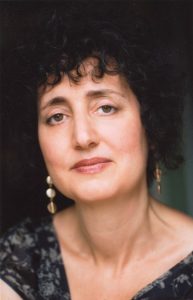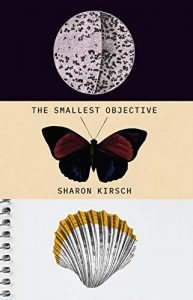Interview with Sharon Kirsch, author of The Smallest Objective
 Sharon Kirsch’s new book, The Smallest Objective, is both topical and universal. This intriguing narrative nonfiction examines the complexities of lives lived: a personal and literal spring-cleaning—the need to sift, take stock and filter for the important things; our concern for senior members of our family, and the consolation offered by staying close to loved ones even when we can’t reach them.
Sharon Kirsch’s new book, The Smallest Objective, is both topical and universal. This intriguing narrative nonfiction examines the complexities of lives lived: a personal and literal spring-cleaning—the need to sift, take stock and filter for the important things; our concern for senior members of our family, and the consolation offered by staying close to loved ones even when we can’t reach them.
Entrusted with her mother’s move to an assisted-living facility after fifty years in the same home, the author crafts an intricate literary memoir about the hidden recesses of a Montreal family (some at the fringes of the law), and the treasures that the past can bring in the face of a difficult present. Marking this passage in her life, the book is also a chronicle about mid-century Montreal. Included are black-and-white photographs highlighting some of the articles that spoke to Kirsch, disclosing her past.
We’re delighted to feature this interview with Sharon.
Tell us about your beginning, where are you from?
I was born and raised in Montreal, a city unusual in its blend of French and English languages and cultures. Growing up in the city’s well-established Jewish community added yet another layer to my experience. I attended a high school that was largely Jewish and English-speaking but where a percentage of classes were taught in French, many of them by immigrants from North Africa. Later I went to a college run by nuns. Such rich cultural and linguistic diversity allows for the kind of nuances and ambiguities that shape many writers, not least, questions about the nature of identity.
How did your childhood impact the writer you’ve become?
Books were plentiful in my family home, since my father read widely. Those on our shelves ranged from elegant leather-bound volumes of Shakespeare’s plays to The Three Musketeers and the condensed Reader’s Digest. Also, like quite a few writers, I grew up as an only child—and, in my case, under the watch of a very overprotective mother. In the absence of sisters or brothers and without the freedom to roam unsupervised, I naturally turned to the life of the imagination—to reading and writing. As a small child, my preferred reading space was my bedroom closet.
Can you tell us a bit about THE SMALLEST OBJECTIVE? What inspired you to write it?
The Smallest Objective is a close-up look at forgotten objects and lost family. This is reflected in the title, which refers to the smallest lens in my grandfather’s microscope—the lens that allows for the highest degree of magnification. I chose this title because it seemed to capture my way of understanding the past and the complex mother-daughter relationship central to my memoir.
The direct circumstances that inspired this book were the emptying of my family home as my mother’s memory began to fail and she no longer had the skills to live independently. Specifically, I was determined to search for a rumoured buried treasure. After some preliminary excavations with a team of archaeologists, I went on to discover by myself all kinds of hidden treasures, each one revealing a Montreal personality largely or entirely unknown to me: a celebrated black sheep in the family turned raconteur, a child immigrant from Lithuania who overcame the odds to find his vocation as a botanist, a daring young woman coming of age in the lead-up to the sexual revolution of the 1960s who, tragically, proved unable to fulfill her promise. This last story serves as a reminder of the fragility of life when this is top of mind for all of us. Ultimately, The Smallest Objective shares a personal story of both loss and recovery.
What is the best writing advice you’ve ever had, and the worst?
One of the best pieces of writing advice came from the US novelist and memoirist Beverly Lowry: “Write to the punchline.” In other words, take care that every element of your writing is essential to where you end up. I don’t think anyone has ever given me bad advice on writing. In my view, one example of disastrous advice would be this: “All you need is inspiration.” For most authors, continual revision and ruthless self-editing are also vital aspects of the creative process.
What is your writing process like? Are you a pantser or a plotter?
Funnily enough—because I tend to be highly structured in other areas of my life—I’m more of a pantser. For me, the pleasure of the first draft is allowing the words to tumble out, relatively unchecked. Only in this way, without knowing what comes next, can I experience a freshness and freedom of composition. Typically, I’ll have imagined an opening sentence or paragraph, and I take it from there. Of course, this approach later requires rigorous rewriting and editing.
Do you need a special place to write?
Yes, my writing environment has to be quiet, and I need to feel that I’m alone with the words. A window, preferably with a view of a tree or two, is a help. I also don’t like to be surrounded by clutter, even though I can be somewhat untidy in other areas of my life, as my husband would no doubt confirm!
Are you part of a writing community or writing group?
I did belong to a small writing group many years ago, but it eventually disbanded. In more recent years, I’ve worked with another author I call my “writing partner.” Although she’s based in Philadelphia and I’m in Toronto, we regularly exchange and comment on each other’s work in progress. For book-length writing projects like The Smallest Objective, I try to have at least one other writer friend read through and critique a late draft. Maintaining my membership in The Writers Union of Canada is also important for staying on top of developments in the profession and keeping current. Overall, I do find the input and support of other writers essential.
Who are your favourite authors?
There are so many wonderful writers. Virginia Woolf counted as an early favourite. As a teenager, I read and reread her novels The Waves and To the Lighthouse. I adore the nature stories of E.B. White (Charlotte’s Web) and Faith McNulty (The Wildlife Stories of Faith McNulty). Also from an earlier generation, Walker Percy is rightly admired for his one-of-a-kind novel The Moviegoer. Turning to contemporary authors, I’m a huge fan of the short story writers Joy Williams and Alice Munro.
What are you reading now?
I just finished Dual Citizens by Alix Ohlin, a delightful novel that alternates between Montreal and New York City. It’s a story of sisters—Lark and Robin—who are raised by an emotionally distant mother, leading to an especially charged relationship between the two girls. Prior to that, I read The Work by my friend Maria Meindl, a singular novel about passion and obsession in Toronto’s theatre world. These two novels, both comic and poignant, are great reads for women.
———————
Find out more about Sharon on her website https://sharonkirsch.com/
Media Contact: Janis Kirshner, jkirshner@sympatico.ca
THE SMALLEST OBJECTIVE
 From the author of What Species of Creatures, Sharon Kirsch, comes The Smallest Objective, an intricate and melancholy personal memoir about a daughter’s last days with her mother, the hidden recesses of family history, and the treasures that the past can bring in the face of a difficult present.
From the author of What Species of Creatures, Sharon Kirsch, comes The Smallest Objective, an intricate and melancholy personal memoir about a daughter’s last days with her mother, the hidden recesses of family history, and the treasures that the past can bring in the face of a difficult present.
Having moved her elderly mother into a care home, the author of The Smallest Objective must now empty the family home of half a century, discovering as she does so a series of small objects that unlock her family’s past: a lantern slide, a faded recipe book, a postcard from Mexico, a nugget of fool’s gold.
With the object of staving off grief while attending to her mother’s final days, Sharon embarks on a quest to retrieve the origin and circumstances surrounding each of these articles. Along the way, she uncovers the stories of several early- to mid-century Montreal Jewish personalities — a Runyonesque hustler, a Lithuanian botanist, and a self-made young woman — as well as the extent to which they were punctured and shaped by the muffled anti-Semitism of the time.
The Smallest Objective examines the minutiae of lives lived, our concern for senior members of our family, the time we need to sift, take stock, and filter out the important things, and the consolation offered by staying close to loved ones even when we can’t reach them.
Get the book HERE
Category: Interviews, On Writing
























